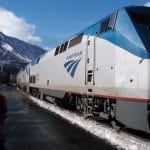WASHINGTON – The Republican chairman of the House Transportation & Infrastructure Committee, Rep. John Mica of Florida, added to his anti-labor reputation July 19 by inserting language in an aviation bill aimed at pressuring Senate Democrats to overturn a National Mediation Board decision allowing more democratic representation elections among airline and rail workers.
Not to be lost here is that were the UTU tentative national rail agreement rejected, and the outcome turned over to third parties, Mica would take the lead in deciding the outcome – and it is likely he would push for a congressionally imposed settlement quite unfavorable to workers.
Mica’s latest assault on labor is in the form of legislative language to halt essential air service subsidies to states of three labor-friendly Senate Democrats — Majority Leader Harry Reid (D-Nev.), Senate Commerce Committee Chairman Jay Rockefeller (D-W.Va.), and Senate Finance Committee Chairman Max Baucus (D-Mont.).
Rockefeller told the Associated Press that the Mica action was in retaliation for Senate Democrats refusing to accept an anti-labor provision in a Federal Aviation Administration authorization bill.
Mica, who is pushing to eliminate Amtrak, slash transit funding and prevent Transportation Security Administration workers from joining a union, has been on a tear to overturn an NMB ruling that brings airline and railroad representation elections in tune with all other democratic elections.
The NMB last year ended a 75-year practice that counted those not voting in rep elections as having voted against union representation. Instead, rep elections are now determined by a majority those actually voting.
No other democratic elections count those not voting as having cast negative ballots. The NMB merely brought airline and railroad rep elections under the same rules affecting all other elections in America. Indeed, if congressional elections followed the old NMB procedure, which Mica wishes to restore, many House and Senate lawmakers would not have been elected.
Mica is piqued that the changed NMB rep-election rule could make it easier for unions to organize airline and railroad workers.
Although the Republican controlled House voted to overturn the new NMB rep-election rule as part of a reauthorization of the Federal Aviation Administration, the Senate has refused to go along.
The result has been a stalemate and a series of extensions to keep the FAA operating. In the latest extension effort, Mica inserted language eliminating essential air service to the states of the Reid, Rockefeller and Baucus, who are among the most staunch opponents of overturning the NMB ruling through legislation.
It is a game of chicken, because if the latest extension is not passed, thousands of FAA employees would be furloughed, although the nation’s air traffic control system would continue operating. The Senate has showed no sign of capitulating to Mica.
